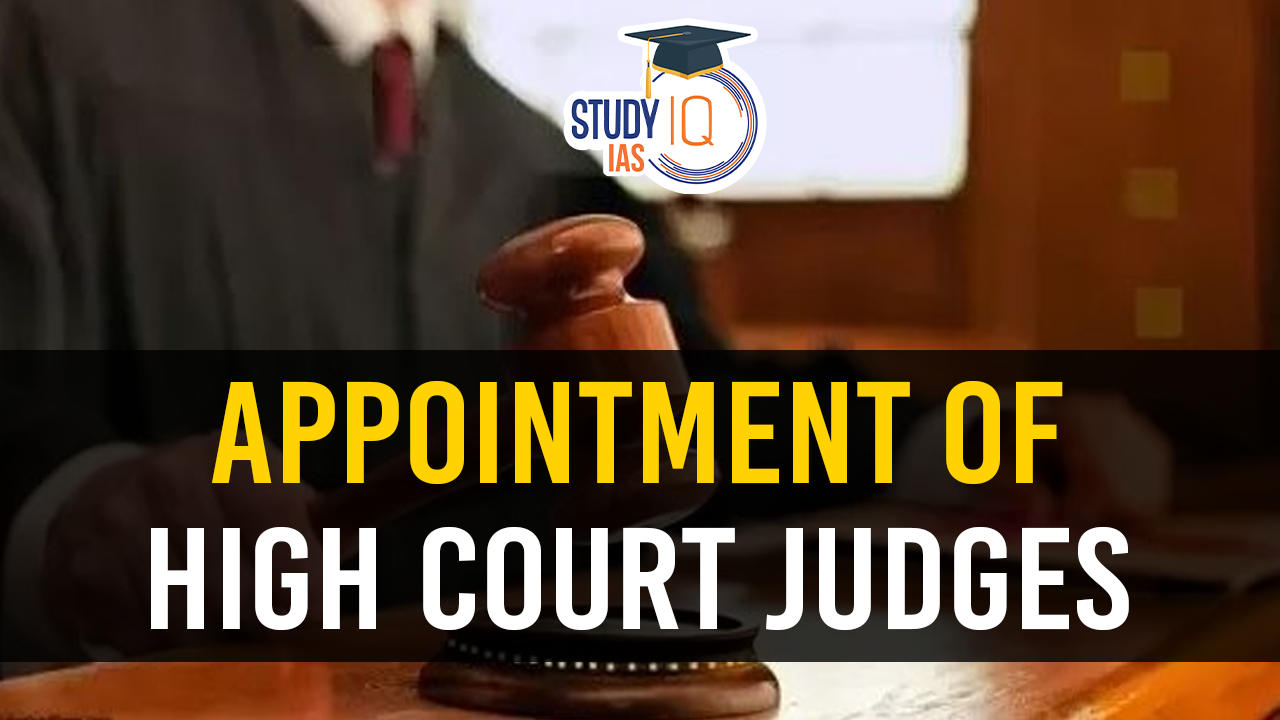Table of Contents
Context: The SC Collegium recommended a new Chief Justice for 5 High Courts: Madhya Pradesh, Karnataka, Gauhati, Patna, and Jharkhand.
Appointment of High Court Judges
- Article 217: Every Judge of a High Court shall be appointed by the President by warrant under his hand and seal.
- This is done after consultation with the Chief Justice of India (CJI), the Governor of the State and the Chief Justice of the High Court.
- Qualifications: (Article-217)
- Citizens of India
- He/she should have held a Judicial office for at least 10 years.
- They should have for at least 10 years been an advocate of a High Court.
| Constitutional Provisions |
|
Appointment Process of High Court Chief Justice
- Recommendation by Collegium: The Supreme Court Collegium (headed by the CJI and comprising 4 senior-most SC judges) recommends names for the Chief Justice of a High Court.
- Seniority, merit, and regional representation are key considerations.
- Central Government’s Role: The Union Ministry of Law forwards the Collegium’s recommendation to the Prime Minister.
- The PM advises the President on formal appointments.
- The government can seek clarification cannot reject the Collegium’s recommendation indefinitely.
- Oath & Tenure: The appointed CJ takes oath under Article 219.
- Retires at 62 years(Article 217(1)).
| Fact |
|
Procedure of Appointment of HC Judges
- Initiation: The proposals of names for appointment as a judge in the High Court are initiated by the Chief Justice of the concerned High Court.
- High Court Collegium:
- The Chief Justice of the High Court consults the two senior-most judges of the High Court before proposing such names.
- Scrutiny by Government:
- Recommendations of the HC Collegium are sent to the Governor, Chief Minister and the CJI.
- The Governor, based on the advice of the Chief Minister, sends the proposal to the Minister of Law and Justice at the Centre.
- The Union Law Ministry conducts a background check and sends the recommendation to the CJI to consider it with the rest of the SC collegium.
Supreme Court Collegium
- Composition of collegium: It consists of the CJI and two senior-most judges of the Supreme Court.
- Decision of collegium: The Supreme Court collegium then considers such names recommended by the High Court collegium.
- SC collegium has the power to reject the names recommended by the High Court collegium.
- Decision of the Union government:
- After due deliberations on such names, the Union Cabinet advises the President to appoint such persons as judges in the High Court.
Key Points
- Collegium System: Evolved from the Three Judges Cases(1981, 1993, 1998), it is a judicial precedent, not mentioned in the Constitution.
- Difference from CJI Appointment: CJI is appointed solely by seniority, while HC CJs are appointed based on Collegium recommendations.
- Controversies: Lack of transparency, delays in appointments, and government-judiciary tussles.
| Did You Know? |
|
Elevation From High Court to Supreme Court Judge
Despite Justice B.V. Nagarathna’s dissent, Justice Pancholi was sworn in as a Supreme Court judge on 29 August 2025.
Process of Elevation of a Judge in India
- High Court to Supreme Court Elevation: Governed by Article 124(2) of the Constitution.
- The Supreme Court Collegium, headed by the Chief Justice of India (CJI) and four senior-most judges, recommends names for appointment.
- Collegium Process:
- The Collegium considers:
- Merit and judicial performance (quality of judgments, integrity).
- Seniority of judges across High Courts.
- Regional representation (ensuring all states/HCs get a fair share).
- Diversity factors – gender, caste, community, marginalised groups.
- The Collegium consults senior SC judges familiar with the functioning of the concerned High Court.
- The Collegium considers:
- Executive Role: The Central Government (Law Ministry) receives Collegium recommendations and may:
- Accept them, or return them once for reconsideration.
- If the Collegium reiterates the recommendation, the government is bound to appoint.
- Formal Appointment: The President of India, under Article 124, makes the final appointment based on Collegium recommendations.


 List of Chief Ministers of Maharashtra F...
List of Chief Ministers of Maharashtra F...
 Electoral System in India 2026: SIR Upda...
Electoral System in India 2026: SIR Upda...
 SLAPP Suits: Meaning, Examples, Impact o...
SLAPP Suits: Meaning, Examples, Impact o...

























